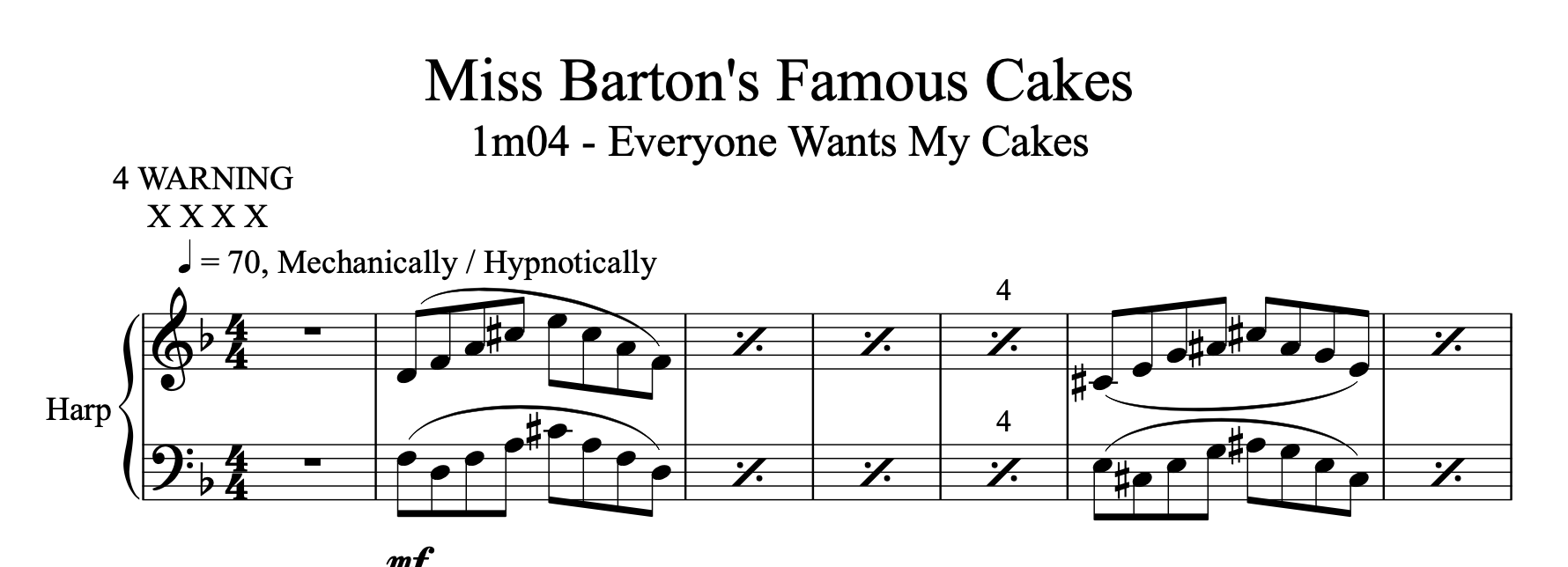Recalling The Past for "Miss Barton's Famous Cakes"
When I got the call from director Jared Hirsch to work on Miss Barton, it was clear from the beginning that he had a very specific vision for his short film. He described a nostalgic scene: a rainy night, a woman alone in her home, two waterlogged detectives. Shot in black and white, Jared and his co-director Nelson Vicens referenced influences such as Alfred Hitchcock and The Twilight Zone, and as for the music there was only one suggestion and it was already where my mind was headed: “Bernard Herrmann”.
Before having seen the actual picture, I sat down and wrote Jared a 3 minute “exploration” of ideas for the film. This early exploration was inspired more by Psycho than by the Twilight Zone (it was later I’d start to hone in on Twilight Zone as the primary inspiration). Most of the ideas in this exploration did not make it into the final film, with the exception of a segment at 2:12 into the piece that was used for the moment where Miss Barton comes to a realization…. it’s a highlight moment of the score for me and it also jumped out at Jared as well.
After discussing this exploration, it was decided that the tone we were aiming for was more like an episode of The Twilight Zone than a Hitchcock film. As they prepared the edit, I got to work watching as many twilight zone episodes as I could, studying the music. I tried to identify a couple of the signature sounds that make Twilight Zone sound like Twilight Zone, and narrowed it down to a few key things:
Instrumentation - relatively sparse, frequent use of harp, vibraphone, woodwinds, and muted brass
Melodic ideas - repetitious, moving in stepwise motion (rarely any leaps in melody), almost hypnotic
It became clear quickly that the software instrument harp that I had was not sufficient for the amount of harp writing I was putting into the score, and so at my suggestion we turned to a friend of mine, Anna Maxwell, who is a harpist in New York, to perform the harp portions of the score. I produced sheet music and sent it off to her and she recorded remotely, with a recording of the rest of the orchestra in her earbuds so she could match my performances.
There are several primary motifs in the score. The first and most important is the hypnotic idea that plays over the opening titles and represents the cakes themselves. It is suggested in the film that Miss Barton’s cakes are so good… they almost seem to have a power over people. They create an obsession and in fact trigger two insane jailbirds to go on a killing spree over it. The music plays into this obsession and gives the cakes an almost magical, spellbinding quality. This motif is played on harp and doubled on vibraphone.
The second motif is the “danger” motif which can be heard at the start of “Hello Detectives”. Stepwise oblique motion in the woodwinds by a half step creates a sense of unease. We are not sure what these detectives want, or why they are here. In fact, as we discover we cannot even be sure they are who they say they are.
There are several smaller motifs throughout the score, including a low idea in the basses and bass clarinet for the “Butcher Boys”, and some chillingly intense moments of chaos and discordant pizzicato strings in the climax of the film (their pseudo-random notes are almost like the prickling of the hairs on the back of one’s neck, or the point of a knife).
Despite the short runtime of only about 9 minutes, the score took several weeks to complete and went through a number of revisions to get to the final version you hear in the film. In the end, I am very proud of this project and in the sense of nostalgia for the past that it creates. I hope that you enjoy it and will consider supporting me by purchasing the score on band camp.


